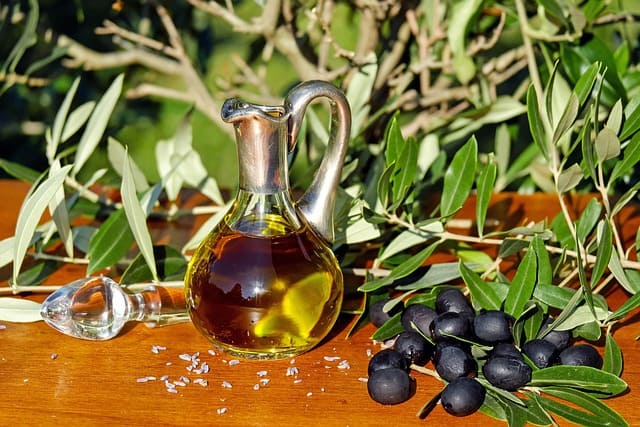Olive oil is a common household item that has a variety of uses, including cooking and skincare. However, some people wonder if they can use olive oil on plant leaves. The answer is yes, but with some caveats.
Understanding the properties of olive oil and how they interact with plant leaves is essential before using it on your plants. Olive oil contains fatty acids and nutrients that can benefit plants, but it can also block the pores on the leaf’s surface and attract dust and pests.
It is crucial to use diluted olive oil and apply it sparingly to avoid any potential harm to the plant.
Why clean plant leaves is another question that gardeners often ask. Dust and debris can accumulate on plant leaves, blocking the pores and reducing the plant’s ability to absorb sunlight and nutrients. Cleaning plant leaves can also help prevent pests and diseases from taking hold and keep your plants looking healthy and vibrant.
Key Takeaways
- Olive oil can be used on plant leaves, but it should be diluted and applied sparingly to avoid any harm to the plant.
- Cleaning plant leaves is essential to maintain plant health and prevent pests and diseases.
- Alternative oils and natural cleaning methods can also be used to clean plant leaves.
See these other top posts in this category:
- Can You Put Mulch in The Bottom of Potted Plants?
- Can You Put Fake Plants in a Turtle Tank?
- Can You Propagate An Ice Plant In Water?
Understanding Olive Oil and Plant Leaves
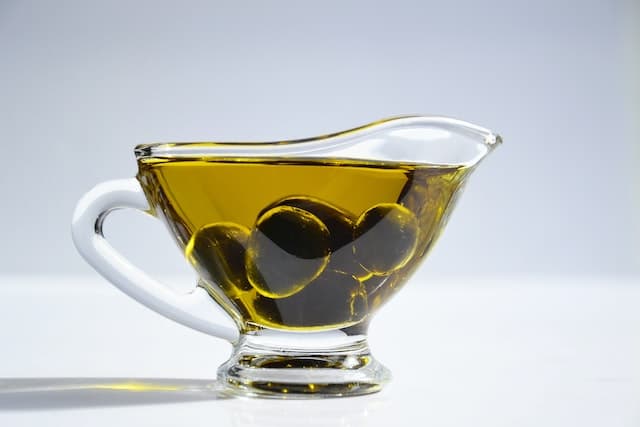
Olive oil is a popular and versatile oil that is commonly used in cooking. It is also known for its health benefits and has been used in traditional medicine for centuries. However, when it comes to using olive oil on plant leaves, there are some things to consider.
Plant leaves are an essential part of a plant’s structure and function. They are responsible for photosynthesis, which is the process by which plants convert sunlight into energy. Leaves also help regulate the plant’s temperature and protect it from environmental stressors.
When it comes to using olive oil on plant leaves, it is important to note that pure, undiluted olive oil should not be applied directly to the leaves. This is because it can block the pores on the leaves, preventing them from absorbing and filtering the air. This can lead to a decrease in photosynthesis and overall plant health.
However, there are some benefits to using olive oil on plants when it is used correctly. For example, olive oil is rich in vitamin E, which plays a significant role in maintaining healthy plant growth and function. When used in moderation and diluted with water, olive oil can help nourish and protect plant leaves.
It is also important to note that olive oil is not the only option when it comes to caring for plant leaves. There are many other natural and safe alternatives that can be used to keep leaves healthy and shiny, such as coconut oil, neem oil, and even banana peels.
Why Clean Plant Leaves
Cleaning plant leaves is an essential task for any plant owner. Dust particles can build up quickly on the leaves of houseplants, which can lead to health problems for the plants. When dust covers the leaves, it blocks the sunlight, which is essential for photosynthesis.
Cleaning plant leaves is necessary to allow the plant to absorb sunlight and carry out photosynthesis effectively.
Moreover, dust particles can attract pests and insects, which can harm the plant. Insects like spider mites, aphids, and mealybugs love to feed on dust-covered leaves. By cleaning the leaves, you can remove the dust particles and prevent pests from infesting your plants.
Another reason to clean plant leaves is to make them shine. Shiny leaves look attractive and healthy, which can enhance the overall look of your indoor garden. By cleaning the leaves, you can remove the dust and dirt that dulls the plant’s appearance and make them look shiny and vibrant.
There are several ways to clean plant leaves, including using water, a damp cloth, or a leaf shine spray. Using olive oil to clean plant leaves is also an option, but it may not be the best choice.
While olive oil can make the leaves shiny and remove dust, it can also attract pests and insects due to its intense aroma. Additionally, olive oil can clog the pores on the leaves, which can prevent the plant from breathing and carrying out photosynthesis effectively.
Methods of Cleaning Plant Leaves
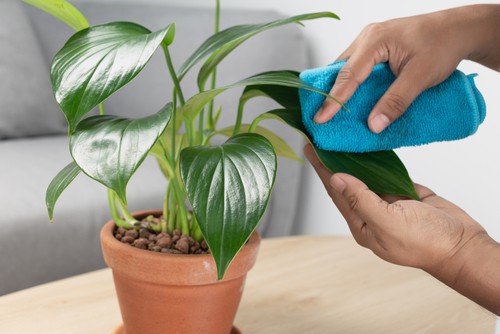
When it comes to cleaning plant leaves, there are several methods to choose from. Some methods are more effective than others, and some may even cause harm to the plant. Here are a few methods to consider:
1. Water
One of the simplest and most effective ways to clean plant leaves is with water. Simply fill a spray bottle with clean water and mist the leaves until they are damp. Then, gently wipe the leaves with a soft cloth or paper towel to remove any dust or debris.
2. Soap and Water
For plants with particularly dirty or dusty leaves, a solution of mild soap and water can be used. Mix a few drops of mild liquid soap with a quart of water and use a soft cloth or sponge to clean the leaves. Be sure to rinse the leaves thoroughly with clean water to remove any soap residue.
3. Brush
For plants with rough or textured leaves, a soft brush can be used to remove dirt and debris. Use a soft-bristled brush, such as a toothbrush or paintbrush, to gently scrub the leaves. Be careful not to scrub too hard, as this can damage the leaves.
4. Shower
Another effective way to clean plant leaves is to give them a shower. Simply place the plant in the shower and use the handheld showerhead to rinse the leaves. Be sure to use lukewarm water and avoid using hot or cold water, as extreme temperatures can damage the leaves.
5. Misting
Misting is a great way to clean plant leaves and increase humidity at the same time. Simply fill a spray bottle with clean water and mist the leaves until they are damp. This method is particularly useful for plants that require high humidity, such as tropical plants.
6. Humidity
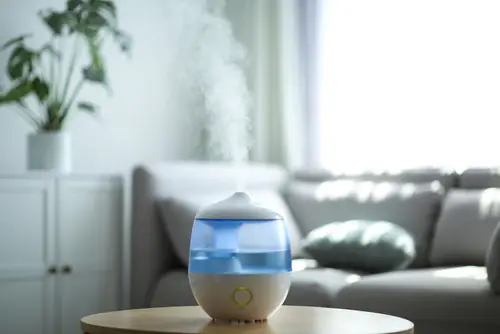
Finally, increasing humidity can help keep plant leaves clean and healthy. Placing a tray of water near the plant, or using a humidifier, can help increase humidity levels and prevent dust and debris from accumulating on the leaves.
Olive Oil for Cleaning Leaves
Benefits of Olive Oil
Olive oil has a number of benefits for cleaning plant leaves. It is an effective way to remove dust and dirt from the leaves, which can help the plant to breathe and absorb sunlight more effectively. Additionally, olive oil can give leaves a healthy shine, making them look more vibrant and attractive.
One of the key benefits of using olive oil on plant leaves is that it can help to repel pests. This is because the oil contains a number of compounds that are toxic to insects, making it an effective natural insecticide. This can help to protect your plants from damage caused by pests such as aphids and spider mites.
Another benefit of using olive oil on plant leaves is that it can help to promote healthy growth. Olive oil contains a number of nutrients that are beneficial to plants, including vitamin E and fatty acids. These nutrients can help to strengthen the plant’s cell walls, making it more resistant to disease and other forms of damage.
How to Use Olive Oil
To use olive oil for cleaning plant leaves, you will need a few basic supplies. These include a soft cloth or sponge, a small bowl of warm water, and a bottle of pure olive oil.
To begin, dampen the cloth or sponge in the warm water and wring out any excess moisture. Then, add a few drops of olive oil to the cloth or sponge and gently wipe the leaves of your plants. Be sure to cover the entire surface of each leaf, paying special attention to any areas that are particularly dirty or dusty.
Once you have finished cleaning the leaves, use a clean, dry cloth to wipe away any excess oil. This will help to prevent the leaves from becoming greasy or attracting dust and dirt.
It is important to note that while olive oil can be an effective way to clean plant leaves, it should be used sparingly. Too much oil can clog the pores of the leaves, making it difficult for the plant to breathe and absorb sunlight. It is also important to avoid using olive oil on plants that are sensitive to oil, as this can cause damage to the leaves and stems.
Alternative Oils for Cleaning Plant Leaves
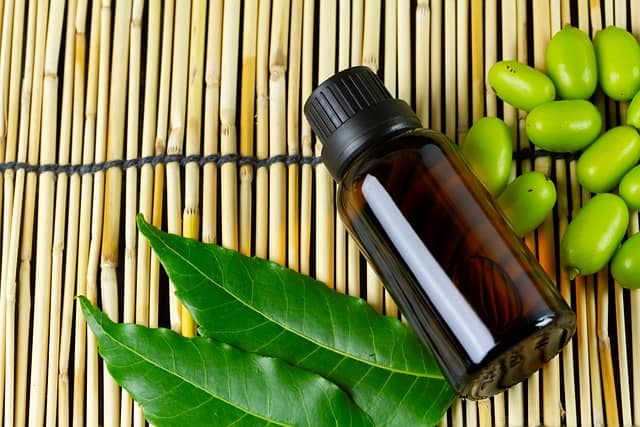
When it comes to cleaning plant leaves, olive oil may not always be the best option. However, there are alternative oils that can be used to clean plant leaves effectively. Here are some of the best options:
1. Vegetable Oil
Vegetable oil is a great alternative to olive oil for cleaning plant leaves. It is a mild oil that is gentle on plants and can effectively remove dust and grime from leaves.
To use vegetable oil for cleaning plant leaves, mix one teaspoon of vegetable oil with one quart of water. Apply the mixture to the leaves using a soft cloth or spray bottle, and then wipe the leaves clean with a dry cloth.
2. Coconut Oil
Coconut oil is another great option for cleaning plant leaves. It is a natural oil that is gentle on plants and can effectively remove dust and grime from leaves.
To use coconut oil for cleaning plant leaves, mix one tablespoon of coconut oil with one quart of water. Apply the mixture to the leaves using a soft cloth or spray bottle, and then wipe the leaves clean with a dry cloth.
3. Neem Oil
Neem oil is a natural oil that is extracted from the seeds of the neem tree. It is a great option for cleaning plant leaves because it is a natural insecticide and can effectively remove dust and grime from leaves.
To use neem oil for cleaning plant leaves, mix one teaspoon of neem oil with one quart of water. Apply the mixture to the leaves using a soft cloth or spray bottle, and then wipe the leaves clean with a dry cloth.
4. Canola Oil
Canola oil is a mild oil that is gentle on plants and can effectively remove dust and grime from leaves. To use canola oil for cleaning plant leaves, mix one teaspoon of canola oil with one quart of water. Apply the mixture to the leaves using a soft cloth or spray bottle, and then wipe the leaves clean with a dry cloth.
5. Horticultural Oil
Horticultural oil is a refined oil that is specifically designed for use on plants. It is a great option for cleaning plant leaves because it is a natural insecticide and can effectively remove dust and grime from leaves.
To use horticultural oil for cleaning plant leaves, mix one teaspoon of horticultural oil with one quart of water. Apply the mixture to the leaves using a soft cloth or spray bottle, and then wipe the leaves clean with a dry cloth.
Other Plant Leaf Cleaning Methods
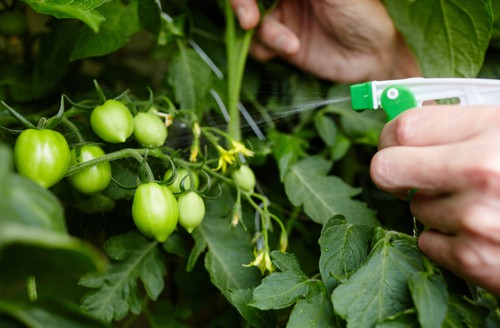
In addition to using olive oil, there are several other methods to clean plant leaves. Here are some alternative options that can help keep your plants looking healthy and vibrant.
1. Milk
Milk is a natural and gentle cleaning agent that can be used to clean plant leaves. It contains lactic acid, which can help to break down dirt and grime on the leaves. To use milk as a cleaning solution, mix it with equal parts water and apply it to the leaves using a soft cloth. Gently wipe the leaves clean, being careful not to damage them.
2. Vinegar
Vinegar is another natural cleaning agent that can be used to clean plant leaves. It contains acetic acid, which can help to dissolve dirt and grime on the leaves. To use vinegar as a cleaning solution, mix it with equal parts water and apply it to the leaves using a soft cloth. Gently wipe the leaves clean, being careful not to damage them.
3. Mayonnaise
Mayonnaise is a surprising but effective cleaning agent for plant leaves. It contains oils and fats that can help to dissolve dirt and grime on the leaves. To use mayonnaise as a cleaning solution, apply a small amount to a soft cloth and gently wipe the leaves clean. Be sure to rinse the leaves thoroughly with water after cleaning.
4. Baby Oil
Baby oil is a gentle and effective cleaning agent for plant leaves. It contains mineral oil, which can help to dissolve dirt and grime on the leaves. To use baby oil as a cleaning solution, apply a small amount to a soft cloth and gently wipe the leaves clean. Be sure to rinse the leaves thoroughly with water after cleaning.
5. Lemon Juice
Lemon juice is a natural and effective cleaning agent for plant leaves. It contains citric acid, which can help to dissolve dirt and grime on the leaves. To use lemon juice as a cleaning solution, mix it with equal parts water and apply it to the leaves using a soft cloth. Gently wipe the leaves clean, being careful not to damage them.
Potential Risks of Using Olive Oil
While olive oil can provide certain benefits to plants, there are also several potential risks associated with using it on plant leaves.
Firstly, olive oil can block the pores on plant leaves, known as stomata, which can prevent the plant from taking in air and releasing moisture. This can lead to the plant withering and turning brown.
Additionally, olive oil can trap heat from the sun, which can cause plants to burn and wither, especially if they are exposed to direct or indirect sunlight.
Using olive oil on plant leaves can also create a breeding ground for bacterial infections, as the oil can attract and hold onto dirt and other contaminants. This can lead to the growth of harmful bacteria that can damage the plant and even spread to other plants in the area.
It is also important to note that using too much olive oil can have downsides. While it can help to moisturize and protect the leaves, using too much can create a greasy film that attracts dust and other particles, which can block the pores and prevent the plant from taking in air.
Understanding the Role of Fatty Acids and Nutrients
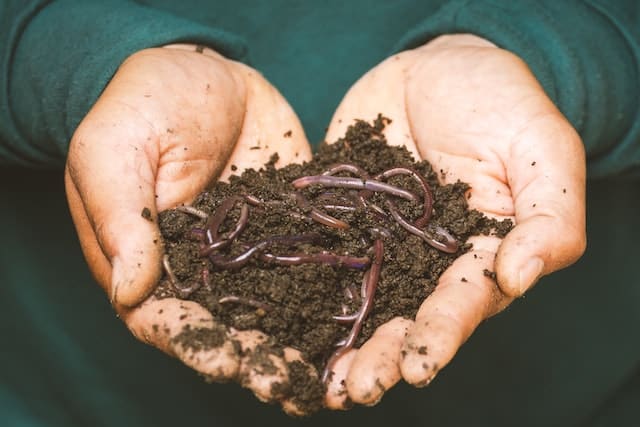
Olive oil is a popular and versatile oil that is used in many households for cooking and as a salad dressing. But can you put olive oil on plant leaves? The answer is yes, but it is important to understand the role of fatty acids and nutrients in plant growth.
Fatty acids are essential for plant growth and development. They are the building blocks of cell membranes and play a crucial role in photosynthesis.
Olive oil is rich in monounsaturated fatty acids (MUFAs), which are considered healthy for humans and plants alike. When used as a foliar spray, olive oil can help improve the health and vigor of plants.
In addition to fatty acids, plants also need a variety of nutrients to grow and thrive. These include macronutrients like nitrogen, phosphorus, and potassium, as well as micronutrients like iron, zinc, and manganese.
Fertilizers can be used to provide these nutrients to plants, but it is important to use them in the right amounts and at the right time to avoid over-fertilization, which can damage plants.
Mineral values are also important for plant growth. These minerals are found in the soil and are absorbed by plant roots. However, soil quality can vary greatly depending on factors like climate, geography, and human activity.
Adding flake humus to the soil can help improve its quality by increasing its water-holding capacity, improving soil structure, and providing nutrients to plants.
The Importance of Photosynthesis
Photosynthesis is a natural process that occurs in green plants, where light energy is captured and used to convert water, carbon dioxide, and minerals into oxygen and energy-rich organic compounds. It is a fundamental process that is essential for the survival of plants and other living organisms on Earth.
The process of photosynthesis is initiated by sunlight, which is absorbed by pigments called chlorophyll present in the plant’s leaves. Chlorophyll molecules absorb light energy and convert it into chemical energy, which is then used to fuel the photosynthesis process.
During photosynthesis, plants take in carbon dioxide from the air and water from the soil, which are then converted into glucose and oxygen. Glucose is used by the plant as a source of energy, while oxygen is released into the atmosphere as a byproduct.
Photosynthesis is critical to the production of food and oxygen on Earth. It is the primary source of energy for most living organisms, including humans. Without photosynthesis, life on Earth would not be possible.
Maintaining Plant Health

Maintaining the health of plants is crucial for their growth and longevity. While there are many ways to care for plants, it is essential to know what works and what does not. One common question that arises is whether or not olive oil can be used on plant leaves.
According to gardening experts, olive oil has not been proven to help plants grow and can even hinder the plant’s ability to absorb water and nutrients through its roots if the soil is contaminated. Therefore, it is not recommended to use olive oil on plant leaves for maintaining their health.
To maintain the health of houseplants and indoor plants, it is essential to provide them with proper care. Different types of plants require different levels of care, but some general tips include:
- Watering: Ensure that plants are watered regularly, but not overwatered. Overwatering can lead to root rot, which can be fatal for plants.
- Light: Plants need adequate sunlight to grow and thrive. Make sure to place them in areas with sufficient light, but avoid direct sunlight, which can scorch the leaves.
- Soil: Use high-quality soil that is rich in nutrients and well-draining. Poor-quality soil can lead to root rot and other diseases.
- Fertilizer: Use a balanced fertilizer to provide plants with the necessary nutrients for growth and health.
It is also crucial to monitor plants for any signs of disease or pests. Common problems include yellowing leaves, wilting, and spots on leaves. Addressing these issues promptly can help prevent further damage and maintain the plant’s health.
Some popular plants that require specific care include the fiddle leaf fig, known for its large, fluffy leaves that are prone to dust accumulation and creases. Using a soft cloth or brush to clean the leaves regularly can help maintain their health and appearance.
Dealing with Pests
When it comes to dealing with pests on plant leaves, many gardeners wonder if they can use olive oil as a natural solution.
While olive oil can kill bug infestations on plants by blocking their pores and making it impossible for them to breathe, it can also attract more bugs and pests due to its intense and distinctive aroma. Therefore, it is not recommended to use olive oil as a primary solution to pest problems.
One common pest that gardeners may encounter on their plants is aphids. While some might say that you can use olive oil as a natural bug repellant, it’s a double-edged sword. Olive oil functions by blocking the pores, which prevents them from breathing normally.
This especially applies to aphids because they absolutely hate olive oil! However, using olive oil on plant leaves can also attract more pests due to its strong aroma.
Instead of using olive oil, gardeners can use a variety of natural solutions to deal with pests on plant leaves. For example, neem oil is a popular natural insecticide that is effective against a wide range of pests, including aphids, whiteflies, and spider mites.
It works by disrupting the pest’s hormonal system and preventing it from feeding and reproducing. Horticultural oil is another natural solution that works by suffocating pests by coating their bodies and blocking their breathing pores.
In addition to natural solutions, gardeners can also take preventative measures to avoid pest problems in the first place. For example, keeping plants healthy and well-nourished can help them resist pests and diseases.
Regularly inspecting plants for signs of pests and removing any infested leaves can also help prevent the spread of pests to other plants. Finally, using physical barriers such as row covers or sticky traps can help keep pests away from plants.
Final Thoughts
It’s not ideal to put olive oil on plant leaves. While some sources suggest that it may help remove dust and give leaves a shiny appearance, the risks outweigh the benefits.
Olive oil is viscous and hydrophobic, which means it can clog the stomata on the leaves and prevent the plant from absorbing air and nutrients. Additionally, using olive oil on plant leaves can attract pests and create a breeding ground for harmful bacteria and fungi.
If you want to clean your plant leaves, there are safer and more effective methods available. Using a spray bottle filled with water or wiping the leaves with a damp cloth can help remove dust and debris without harming the plant. For more stubborn dirt or grime, a mild soapy mix can be used, but be sure to rinse the leaves thoroughly with water afterwards.
Frequently Asked Questions
How can I naturally shine my plant leaves?
There are several natural ways to shine your plant leaves. One way is to use a soft cloth or sponge dipped in a solution of water and milk. Another way is to use a solution of water and a few drops of liquid soap. You can also use a mixture of water and apple cider vinegar.
What is the best oil to use on plant leaves?
While olive oil is often used to shine plant leaves, it is not the best option. Olive oil can block the pores of the leaves, preventing the plant from absorbing and filtering the air. Instead, use a light oil such as neem oil, horticultural oil, or essential oils.
Can coconut oil be used on plant leaves?
Coconut oil is not recommended for use on plant leaves. It can attract dust and insects, which can harm the plant. Additionally, coconut oil can solidify at room temperature and clog the pores of the leaves.
What is the best way to clean and shine plant leaves?
The best way to clean and shine plant leaves is to use a soft cloth or sponge dipped in a solution of water and mild liquid soap. Be sure to rinse the leaves thoroughly with water after cleaning. You can also use a mixture of water and apple cider vinegar to clean and shine the leaves.
Is it safe to use vinegar to clean plant leaves?
Yes, it is safe to use vinegar to clean plant leaves. However, be sure to dilute the vinegar with water before using it. A mixture of one part vinegar to three parts water is recommended.
What are some options for shining indoor plant leaves?
In addition to the natural methods mentioned above, there are several commercial products available for shining indoor plant leaves. Look for products that are specifically designed for use on plant leaves and follow the instructions carefully.

Hey, I’m Lisa and I’ve been an avid gardener for over 30 years. I love writing, talking and living in the garden! Feel free to connect with me on my socials below

